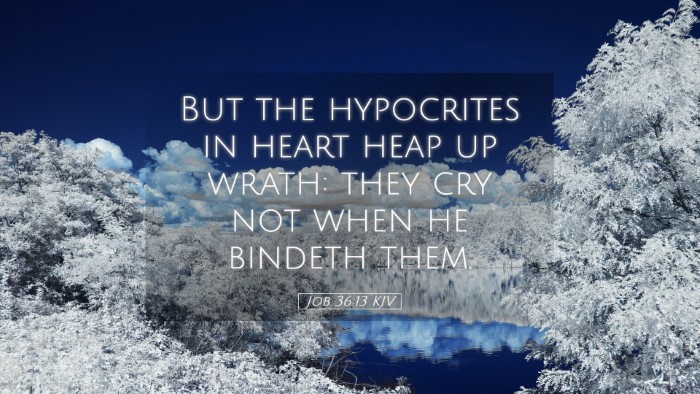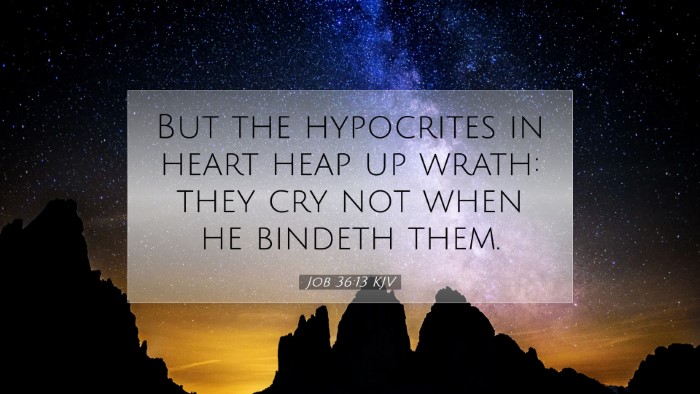Commentary on Job 36:13
Verse: "But the hypocrites in heart heap up wrath: they cry not when he bindeth them." (Job 36:13)
Introduction
The Book of Job is a profound exploration of suffering, faith, and the nature of God. In chapter 36, Elihu speaks to Job, asserting the righteousness of God and the folly of wickedness. Job 36:13 focuses particularly on the hypocrite's heart and the consequences of living in opposition to God’s will.
Contextual Background
Prior to this verse, Elihu elaborates on God's majesty and justice. He emphasizes that God's intentions are always meant to guide and correct mankind. This particular verse serves as a stark admonition regarding the disposition of the hypocrites and their neglect of genuine repentance.
Exegesis
According to Matthew Henry, the term "hypocrites" refers to those whose actions do not align with their professed beliefs. They are insincere in their devotion to God, and thus, Elihu states, they "heap up wrath," indicating a building accumulation of divine judgment against them.
Albert Barnes offers insights into the phrase "they cry not when he bindeth them." This suggests that in times of affliction, hypocrites do not call upon God or repent; instead, they remain obstinate. This lack of response reflects their hardened state against God’s chastening.
The Nature of Hypocrisy
- Betrayal of True Faith: The hypocrite's heart is exposed in the trials, revealing an absence of sincere faith.
- Divine Punishment: Elihu’s mention of "wrath" signifies a fundamental law of divine retribution, echoing throughout scripture.
- Call to Repentance: The hypocrite's refusal to cry out in times of trouble exemplifies a heart that is distant from God, unrepentant.
Divine Judgment and Mercy
The commentary by Adam Clarke highlights the dual themes of judgment and mercy inherent in God's dealings with humanity. God may bind the wicked with afflictions, but His ultimate desire is their repentance. Thus, Elihu's statement warns against the dangers of hypocrisy while simultaneously pointing toward the possibility of redemption.
Spiritual Reflection
For pastors and theologians, this verse serves as a profound reminder of the need for sincerity in our walk with God. Elihu's discourse invites leaders to assess their congregations for signs of spiritual authenticity.
The Consequences of Hypocrisy
The implications of Elihu's warning are expansive:
- Self-Deception: Hypocrisy leads to a hardened heart, making one oblivious to their spiritual condition.
- Isolation from God: A refusal to acknowledge sin cuts off communion with the Creator.
- Accumulation of Wrath: Continued disobedience results in a heavy toll of divine wrath, often culminating in greater suffering.
Applications for Believers
It is essential to examine the heart for hypocrisy. True believers must strive for authenticity in their relationship with God:
- Regular Self-Examination: Implementing a habit of sincere introspection allows believers to detect deceit in their own hearts.
- Encourage Genuine Worship: Pastors should promote a culture of authenticity in worship rather than performance.
- Emphasize the Need for Repentance: It is critical to teach congregations on the importance of confessing sins and seeking God’s face.
Conclusion
Job 36:13 serves as a potent reminder of the dangers of hypocrisy in the life of a believer. Through the voices of renowned commentators, we are called to acknowledge our shortcomings and remain vigilant in our faith. As we hear the warnings of Elihu, may we examine our own hearts, striving always for true devotion and sincerity before God.


